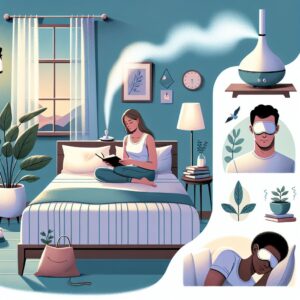Key Takeaways
- Restorative sleep is crucial for overall health, and sleep tracking tools can help you achieve it.
- Wearables like the Oura Ring, Fitbit, and Apple Watch provide valuable insights into sleep patterns.
- Understanding the data from your sleep tracker can guide you towards better sleep habits.
- Accuracy varies among devices, so it’s important to compare features and choose the right one for you.
- While trackers offer insights, they should not replace professional medical advice for sleep disorders.
Unlocking the Secrets of Sleep Tracking
Imagine you could peek inside your brain every night to see the quality of your sleep. Now, that’s almost possible with the help of sleep tracking tools. These nifty gadgets and apps have one goal: to reveal the mysteries of your slumber and help you tap into the rejuvenating power of restorative sleep.
Debunking Sleep Myths
Before we dive into the tech, let’s clear the air. A common misconception is that if you’re in bed for eight hours, you’re getting eight hours of restorative sleep. Not quite. It’s not just about quantity; it’s the quality that counts. And that’s where sleep trackers come in handy.
Another myth is that these tools can cure sleep disorders. They’re brilliant, but they’re not magic wands. They provide data to inform us, but they don’t treat underlying conditions. Always consult with a healthcare professional if you suspect a sleep disorder.
Finding Your Ideal Sleep Tracker
With so many options out there, choosing a sleep tracker can feel like finding a needle in a haystack. But don’t worry, I’ve got you covered. Here’s what to consider:
- Comfort: If it’s not comfortable, you won’t wear it. Simple as that.
- Accuracy: Look for devices that measure a range of metrics like heart rate, movement, and REM sleep.
- Battery life: You don’t want your tracker dying in the middle of the night.
- User-friendly: The data is no good if you can’t understand it. Opt for trackers with clear, intuitive apps or interfaces.
Remember, the best sleep tracker for you is the one that meets your specific needs and fits seamlessly into your life.
Comparing Top Sleep Tracking Tools
Let’s get into the specifics. We’ll look at a few of the top players in the sleep tracking game and see how they stack up against each other.
The Oura Ring Explained
The Oura Ring is like a sleep lab on your finger. It measures your heart rate, body temperature, and movement throughout the night. It’s discreet, comfortable, and its battery can last up to a week. Plus, the app provides a sleep score to help you quickly gauge the quality of your rest.
Fitbit: More Than Just Steps
Fitbit has evolved from a step counter to a comprehensive sleep tracker. It not only tracks your heart rate and movement but also your sleep stages, including REM sleep. The newer models even offer a ‘Smart Wake’ feature that gently rouses you during your lightest sleep phase.
Apple Watch: Harnessing Wearable Tech for Sleep
The Apple Watch isn’t just for closing your daily rings. With the right apps, it can track your sleep too. It measures heart rate, noise levels, and movement. And if you’re already in the Apple ecosystem, it integrates seamlessly with your other devices.
Insight Into Sleep Apps
Not ready to invest in a wearable? Sleep apps for your smartphone can be a great starting point. They use the phone’s sensors to track your sleep, and while they may not be as accurate as wearables, they can still provide a snapshot of your sleep health.
Understanding Bedside Monitors
Bedside monitors like the Withings Sleep Analyzer sit under your mattress, tracking sleep without being worn. They measure sleep cycles, heart rate, and snoring. It’s perfect for those who prefer not to wear anything while sleeping.
In the next section, we’ll delve deeper into the accuracy of these trackers and how to interpret the data they provide. Stay tuned to transform your sleep with science-backed insights.
Now that we’ve explored the tools, let’s understand the engine that powers them. Most sleep trackers use a mix of sensors and algorithms to monitor your sleep. But how do they turn those midnight tosses and turns into data you can use?
Understanding the Technology Behind Sleep Tracking
At the heart of sleep tracking is a technology called actigraphy. It uses accelerometers to measure your movement throughout the night. Combine this with heart rate sensors, and you’ve got a pretty good picture of your sleep. Some devices even measure things like skin temperature and blood oxygen levels for a more comprehensive analysis.
- Accelerometers track movement to determine when you’re asleep or awake.
- Heart rate sensors gauge your relaxation and sleep quality by monitoring changes in your pulse.
- Temperature sensors can detect changes in your body that may indicate different sleep stages.
But remember, while these gadgets are smart, they’re not perfect. They offer a glimpse into your sleep patterns, but they’re not a substitute for professional sleep studies.
Comparing Tracker Data with Professional Assessments
It’s important to know that while sleep trackers provide valuable insights, they don’t measure up to the gold standard of sleep studies, known as polysomnography. This professional assessment is conducted in a sleep lab and monitors brain waves, oxygen levels, and more. It’s the most accurate way to assess sleep quality and diagnose disorders.
Interpreting Your Sleep Data
So you’ve got all this data from your sleep tracker—now what? It’s time to decipher it. Most trackers will give you a breakdown of your sleep stages: light sleep, deep sleep, and REM sleep. Each stage plays a vital role in restorative sleep.
Making Sense of Sleep Cycles
Understanding your sleep cycles is like having a roadmap to better rest. Light sleep is your body’s entry point into sleep, deep sleep is when your body repairs and regenerates, and REM sleep is crucial for memory and mood. A balanced mix of these stages is what makes you feel refreshed in the morning.
Most importantly, don’t get too hung up on the numbers. They’re a tool, not a diagnosis. Use them to spot trends and patterns in your sleep. Are you consistently waking up at 3 a.m.? Do you get more deep sleep on days you exercise? These are the kinds of insights that can guide you to better sleep habits.
Leveraging Data for Better Sleep Habits
Here’s where the magic happens. Use your sleep data to make small tweaks to your routine. If you notice you sleep better on days you exercise, make a plan to get some physical activity every day. If caffeine in the afternoon disrupts your sleep, cut yourself off after lunch. It’s all about using the data to find what works for you.
- Exercise regularly, but not too close to bedtime.
- Avoid caffeine and heavy meals in the hours leading up to sleep.
- Create a relaxing bedtime routine to signal your body it’s time to wind down.
By paying attention to the details and adjusting accordingly, you can transform your nights—and your days.
The Future of Sleep Tracking Tech
As we look to the horizon, the future of sleep tracking is bright and full of potential. With advances in AI and machine learning, we can expect even more personalized and accurate insights into our sleep.
Emerging Technologies in Sleep Science
Imagine a sleep tracker that not only tells you how you slept but predicts how you’ll sleep tomorrow. Or one that could detect sleep apnea from the comfort of your home. These are the kinds of innovations on the horizon, thanks to the tireless work of sleep scientists and technologists. For a glimpse into the future of wearable technology, check out our article on the 2024 best wearables and fitness trackers.
As we continue to push the boundaries of what’s possible, one thing remains clear: the key to unlocking restorative sleep lies in understanding it. And with the right tools and knowledge, we’re well on our way to sweeter dreams and brighter mornings.
So, embrace the tech, listen to your body, and take control of your sleep. The night is yours to reclaim.
Potential for Predictive Sleep Health Insights
The next wave of sleep technology is not just about monitoring; it’s about predicting and improving. Imagine a sleep tracker that can forecast your sleep quality based on your daily activities and provide tailored advice to enhance your rest. This isn’t just a dream—it’s the direction in which sleep technology is headed.
- Devices may be able to predict sleep disturbances before they happen, allowing for preemptive adjustments to routines.
- Advanced algorithms could suggest the best times for you to go to bed and wake up, optimizing your sleep schedule.
- Integration with smart home systems could adjust your environment to promote better sleep, such as dimming lights or adjusting the thermostat.
These advancements could revolutionize the way we approach sleep, turning trackers into personal sleep consultants. However, it’s important to maintain realistic expectations—technology is a tool to assist us, not a panacea for all sleep challenges.
Besides that, the integration of sleep tracking data with other health metrics could provide a holistic view of our wellbeing. By correlating sleep patterns with diet, exercise, and stress levels, we can gain a comprehensive understanding of what contributes to our restorative sleep.
Therefore, as we continue to harness the power of technology, we must also continue to listen to our bodies and respond to the personalized insights our sleep trackers provide.
FAQs
Now, let’s tackle some common questions about sleep trackers and how they can be part of your journey to better sleep.
Can Sleep Trackers Improve Sleep Quality?
While sleep trackers themselves don’t directly improve sleep quality, they provide the insights you need to make changes that can lead to better sleep. By identifying patterns and potential issues, you can adjust your habits to foster a more restful night. For more on this, explore how wearable technology can optimize health.
How Accurate Are Wearable Sleep Trackers?
Wearable sleep trackers are generally accurate in detecting sleep and wakefulness, but they may vary in their ability to precisely identify sleep stages. They are best used as a guide rather than a definitive measure of sleep quality. For the latest recommendations, check out our 2024 best wearables and fitness trackers.
Can Sleep Trackers Help Identify Sleep Disorders?
Sleep trackers can flag irregularities in your sleep patterns that might warrant further investigation, but they are not diagnostic tools. If you have concerns about your sleep, consult a healthcare professional or consider exploring the benefits of HRV as the ultimate metric for stress management and longevity for a thorough assessment.
Are Sleep Trackers Safe to Use Every Night?
Yes, sleep trackers are designed for nightly use. They are non-invasive and generally safe. However, if wearing a tracker causes discomfort or anxiety about sleep, it may be counterproductive. Listen to your body and use the tracker as a helpful tool, not a source of stress. For more information on how to optimize your use of these devices, check out our article on leveraging wearable technology for health optimization.
Moreover, consider the privacy aspects of sleep trackers. Ensure you are comfortable with how your data is being used and stored by the device’s manufacturer.
- Read the privacy policy of your sleep tracker to understand data usage.
- Keep your device’s software up to date to ensure the highest level of security.
Ultimately, the safety of using a sleep tracker every night depends on your personal comfort with the device and its data practices.
How Can I Use Sleep Tracker Data to Change My Sleep Habits?
- Review your sleep data regularly to identify patterns and areas for improvement.
- Adjust your bedtime and wake-up time to align with your natural sleep cycles.
- Incorporate relaxation techniques before bed if your data shows difficulty falling asleep.
- Optimize your sleep environment based on insights about disturbances during the night.
- Consult with a healthcare professional to interpret data if you suspect a sleep disorder.
Armed with data from your sleep tracker, take action to refine your sleep environment and routines. It might mean investing in blackout curtains if light disrupts your sleep, or setting a consistent bedtime to regulate your sleep-wake cycle.
Remember, the key is not to obsess over the data but to use it as a compass guiding you toward better sleep. And don’t be afraid to experiment—small changes can have a big impact on the quality of your rest. Learn more about the role of biofeedback in stress reduction to further enhance your sleep quality.
In the end, whether you’re using a high-tech wearable or a simple app, the goal is the same: to achieve the kind of deep, restorative sleep that leaves you feeling refreshed and ready to take on the day. So, explore the tools available, find what works for you, and embrace the journey to better sleep. Sweet dreams!
Understanding the science behind sleep can significantly improve your rest quality. Tools like sleep trackers are becoming increasingly popular for those looking to analyze their sleeping patterns. These devices can provide insights into sleep stages, disturbances, and overall sleep quality, which can be valuable information for improving sleep hygiene and health.



Leave a Reply